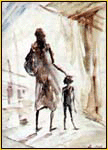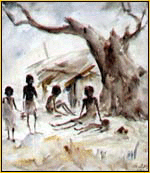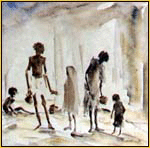


|
Gobardhan
Ash ( 1907 - 96 ), a
serious turn in the art scene of Bengal occurred during the 30ís
of this century and a new trend was set in the works of Rabindra
Nath Tagore and Jamini Roy. This trend could be considered a
counterpart of Abanindra Nathís Bengal School. Budding artists
of this period took new interest about Western European Modern Art
movements and gradually a powerful young group started
experimenting in various media. Gobardhan Ash was born in the year
1907 in a remote village, Begampur of Hooghly district in West
Bengal to a family solely dependent on agricultural income. A
young Gobardhan came to metropolis Calcutta with ardent desire for
art training. He was a student of Indian Art College and was
deeply influenced by Debiprasad Roy Chowdhuri and Atul Basu.
In
the formative period of his career as an artist, Gobardhan
experienced a severely rude shock during the 1943 Bengal Famine.
This man made famine during World War II deeply influenced the
conscience of Bengal and left its deep mark on contemporary
literature, theatre and art. Particularly Gobardhan Ash and his
contemporaries like Zainul Abedin, Chitta Prasad, Somnath Hor
tasted the assault of British imperialism on Indian reality. And
this severe experience changed the entire mode of their artistic
expressiveness. Gobardhan Ash painted a series of famine scenes
depicting endless human misery. Technically his famine paintings
differed from his contemporaries. He used to paint in colour (both
oil and water), while others preferred black and white and
graphics medium.
Possibly
this experience influenced Gobardhan to look deep into the human
life in Bengal villages and formed the basic theme and motivation
for his life long paintings. He also preferred to leave metropolis
and live in his native village. In his mature period in 1950 he
joined the well known Calcutta group, the association which
dominated Indian Art scenario for a considerable period. Artists
like Pradosh Dasgupta, Gopal Ghosh, Prankrishna Pal, Rathin Mitra
and others belonged to this group. An uncompromising artist,
Gobardhan Ash himself formed a group named Art Rebel Centre in
1933 and his endeavour was to set an alternative trend in art
world. He left behind a rich collection of paintings in oil, water
colour and pastel. His contribution towards establishing oil
medium in Bengal art is considerable. A painter extraordinary,
Gobardhan Ash had a social commitment the kind of which is rare
among the artists today.
|



|


